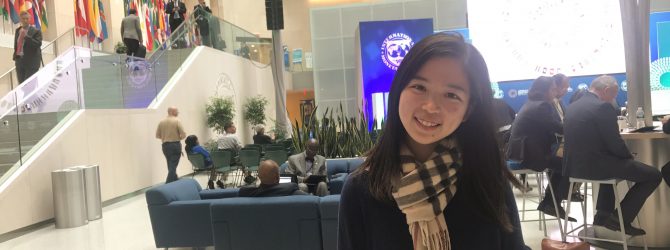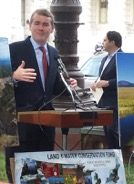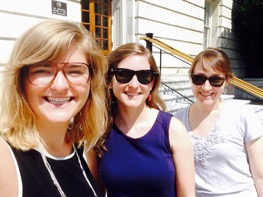Xiao Tan is a second-year CIPA student from China. She is concentrating her studies on Economic and Financial Policy. If you wish to learn more about Xiao, you may read her bio here.



By Lisa Jervey Lennox, CIPA Assistant Director for Communications
Last night, students participating in our CIPA Washington, DC off-campus externship semester discussed leadership experience and political strategy with Tom Perez, the Chair of the Democratic National Committee and former U.S. Deputy Secretary of Labor. Our students on the main Ithaca campus were able to join the discussion –via- Zoom, but I was lucky enough to be in DC and enjoy the class “live.” (more…)

At Cornell’s DC Networking Event, CIPA fellows are offered a unique experience to meet alumni and professionals in public affairs from public, private, and nonprofit sectors. From round table discussions to networking and a reception, the event provided new opportunities to expand networks and link with prospective employers. (more…)
INTERNSHIP: The Wilderness Society
LOCATION: Washington, DC
Orientation for incoming CIPA students is now over and classes are in full swing. We have an outstanding cohort of new students and they are already busy networking with second-year students as they begin their search for a summer 2016 internship.
Our second-years have returned to campus, energized by their summer work and are eager to share their experiences. Allison Springer ’16 is one such student. She offers her story here, in the second installment of our summer 2015 internship series.
Before I came to Cornell, working as an environmental advocate in Washington, DC had never crossed my mind. However, during my time at CIPA I learned about the opportunities for environmental advocacy, and over the summer I spent 10 weeks at The Wilderness Society (TWS). I loved the work because it tapped into a lot of skills I had and also challenged me in new and exciting ways. One project that I spent a great deal of time on was lobbying Congress for reauthorization of the Land and Water Conservation Fund (LWCF). In 1965, Congress created the LWCF as a bipartisan conservation program to use revenues from offshore oil and gas drilling on federal areas to purchase lands and waterways for protection. LWCF funds have been used in 98% of counties in the US for projects ranging from Yellowstone National Park to the athletic fields at Ithaca High School. LWCF will sunset on September 30, 2015 unless reauthorized by Congress.
My journey learning about LWCF began in spring 2015 in the CIPA course “Politics, Policy and Political Management”. I was in the middle of Professor Lamb’s class and looking for a topic for our final group project. The assignment was to take an issue from the agenda of the 114th Congress, analyze it using multiple streams analysis, and determine whether or not the bill would be passed. TWS had already offered me a summer internship in their Washington, DC office, so I reached out to them for a piece of pertinent environmental legislation that could be used for my final project. They recommended LWCF reauthorization, knowing that it would give me a baseline for the work I would be doing during my internship. The work I did on that class project proved invaluable throughout my internship, and the course itself prepared me for the other lobbying work I did this summer.
TWS is part of the greater LWCF Coalition and is a leader of lobbying activities around the program. As the Government Relations Lands Intern, I was responsible for coordinating weekly Congressional communications. Interns from other green groups, such as Sierra Club, Natural Resources Defense Council, and League of Conservation Voters, also participated in this initiative to educate Congressional members on this important piece of legislation. Over the course of the summer I delivered LWCF reauthorization materials to every Congressional office. In addition to Hill communications, the group of interns at TWS worked on a LWCF sign-on letter. We reached out to student organizations at colleges and universities in all 50 states, encouraging them to come together as a collective voice in support of LWCF reauthorization. As of August 7th, we had 55 groups sign-on from 28 states in the US. This letter will be delivered to Members of Congress after the August recess to push for LWCF reauthorization.
Since I started at TWS, House Bill H.R. 1814 to reauthorize LWCF has gained an additional 64 cosponsors reaching 142 total. Additionally, the Senate Energy and Natural Resources Committee passed a LWCF amendment to the Energy Policy and Modernization Act of 2015. I plan on returning to Washington after graduation and starting a career as an environmental lobbyist. My CIPA coursework and experience at TWS has reinforced my passion for environmental issues and my determination to become a leader in the environmental movement.

